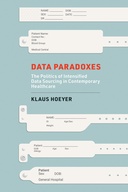Explore

Why healthcare cannot—and should not—become data-driven, despite the many promises of intensified data sourcing.In contemporary healthcare, everybody seems to want more data, of higher quality, on more people, and to use this data for a wider range of purposes. In theory, such pervasive data collection should lead to a healthcare system in which data can quickly, efficiently, and unambiguously be interpreted and provide better care for patients, more efficient administration, enhanced options for research, and accelerated economic growth. In practice, however, data are difficult to interpret and the many purposes often undermine one another. In this book, anthropologist and STS scholar Klaus Hoeyer offers an in-depth look at the paradoxes surrounding healthcare data.Focusing on Denmark, a world leader in healthcare data infrastructures, Hoeyer shares the perspectives of different stakeholders, from epidemiologists to hospital managers, from patients to physicians, analyzing the social dynamics set in motion by data intensification and calling special attention to that which cannot be easily coded in a database. He illustrates how data can be at once helpful, overwhelming, and sometimes disastrous through concrete examples. The COVID-19 pandemic serves as a special closing case study that shows how these data paradoxes carry weighty political implications. By revealing the diverse and sometimes contradictory practices spawned by intensified data sourcing, Data Paradoxes raises vital questions about how we might better use healthcare data.
This book is included in DOAB.
Why read this book? Have your say.
You must be logged in to comment.
Rights Information
Are you the author or publisher of this work? If so, you can claim it as yours by registering as an Unglue.it rights holder.Downloads
This work has been downloaded 85 times via unglue.it ebook links.
- 85 - pdf (CC BY-NC-ND) at Unglue.it.
Keywords
- AI
- Algorithms
- anthropology
- artificial intelligence
- Automation
- Computer science
- Computing & information technology
- Critical Data Studies
- Data
- data infrastructures
- Data mining
- data politics
- data sharing
- data studies
- data work
- data-based management
- Datafication
- Denmark
- digital health
- eHealth
- European Union, EU
- global North
- Health
- health care, healthcare
- Hospitals
- information infrastructures
- intensified data sourcing
- learning healthcare systems
- Medical anthropology
- Medical Sociology
- medicine
- personalized medicine
- real-world data
- real-world evidence
- scandinavia
- science and technology studies
- science, technology and society
- Sociology
- STS
- thema EDItEUR::U Computing and Information Technology::UY Computer science
Links
DOI: 10.7551/mitpress/14926.001.0001Editions

